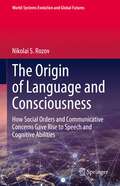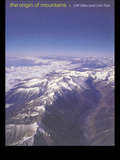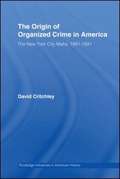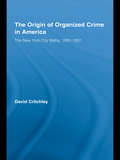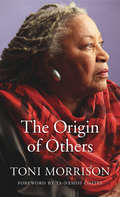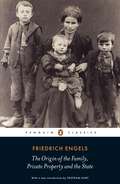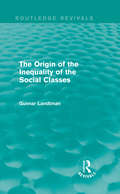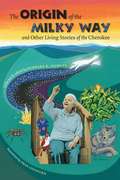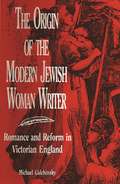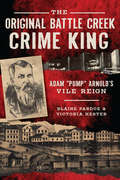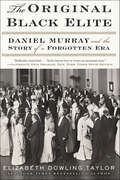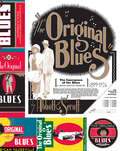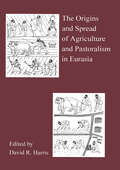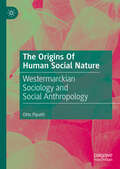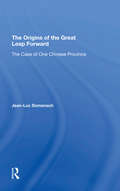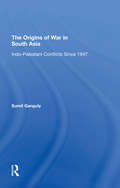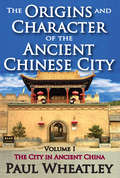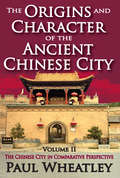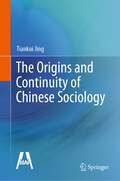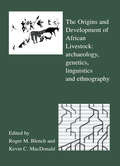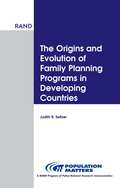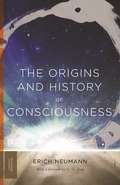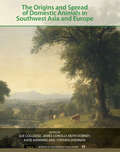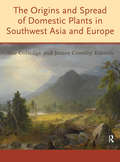- Table View
- List View
The Origin of Language and Consciousness: How Social Orders and Communicative Concerns Gave Rise to Speech and Cognitive Abilities (World-Systems Evolution and Global Futures)
by Nikolai S. RozovThis book presents an evolutionary theory of the origin and step-by-step development of linguistic structures and cognitive abilities from the early stages of anthropogenesis to the Upper Paleolithic. Emphasizing the social nature of the human mind and using an extended version of C.Hempel's explanatory logic, the author proves that language and consciousness emerged and evolved through the daily efforts of our ancestors to overcome mutual misunderstandings in increasingly complex social orders with increasing tasks on memory, thinking, and normative regulation of behavior, with the addition of new and new communicative concerns.The book addresses questions such as the following:What unique social conditions led to the emergence of the first protosyllables and protowords?What steps enabled the crossing of the "linguistic Rubicon" (between animal communication and human speech)?Why were syllables and phonemes needed? How did our ancestors overcome the difficulties of misunderstanding?How, when, and why did ancient people learn to speak in turns? Why did they begin to talk about past and distant events? What is consciousness and how did it evolve along with language?How many original languages were there and why are there roughly 200 philas (language macrofamilies)?How and why did the number of languages and the degree of their complexity change in pre-written history?Did the Romance languages really evolve from Latin?Accordingly, the book will appeal to scholars in various disciplines who are interested in a better understanding of the cognitive aspects of anthropogenesis and the ancient origins of language and consciousness.
The Origin of Mountains
by Cliff Ollier Colin PainThe Origins of Mountains approaches mountains from facts about mountain landscapes rather than theory. The book illustrates that almost everywhere, mountains arose by vertical uplift of a former plain, and by a mixture of cracking and warping by earth movements, and erosion by rivers and glaciers, the present mountainous landscapes were created. It also gives evidence that this uplift only occured in the last few million years, a time scale which does not fit the plate tectonics theory.Another fascinating part of the evidence, shows that mountain uplift correlates very well with climatic change. Mountain building could have been responsible for the onset of the ice age. It certainly resulted in the creation of new environments. Fossil plants and animals are used in places to work out the time of mountain uplift, which in turn helps to explain biogeographical distributions.
The Origin of Organized Crime in America: The New York City Mafia, 1891-1931
by David CritchleyThe Mafia recruitment process, relations with Mafias in Sicily, the role of non-Sicilians in New York¿s organized crime Families, kinship connections, the Black Hand, the impact of Prohibition, and allegations that a "new" Mafia was created in 1931.
The Origin of Organized Crime in America: The New York City Mafia, 1891-1931 (Routledge Advances In American History Ser.)
by David CritchleyIn this stunning book, David Critchley examines the birth of organized crime in New York, including the Mafia recruitment process, relations with Mafias in Sicily, the role of non-Sicilians in New Yorks organized crime Families, the impact of Prohibition, and allegations that a "new" Mafia was created in 1931.
The Origin of Others
by Toni MorrisonWhat is race and why does it matter? Why does the presence of Others make us so afraid? America’s foremost novelist reflects on themes that preoccupy her work and dominate politics: race, fear, borders, mass movement of peoples, desire for belonging. Ta-Nehisi Coates provides a foreword to Toni Morrison’s most personal work of nonfiction to date.
The Origin of Roman London
by Lacey M. WallaceIn this book Dr Wallace makes a fundamental contribution to the study of urbanism in the Roman provinces. She attempts for the first time to present a detailed archaeological account of the first decade of one of the best-excavated cities in the Roman Empire. Delving into the artefact and structural reports from all excavations of pre-Boudican levels in London, she brings together vast quantities of data which are discussed and illustrated according to a novel methodology that address both the difficulties and complexity of 'grey literature' and urban excavation.
The Origin of the Family, Private Property and the State
by Friedrich EngelsThe Origin of the Family, Private Property and the State (1884), was a provocative and profoundly influential critique of the Victorian nuclear family. Engels argued that the traditional monogamous household was in fact a recent construct, closely bound up with capitalist societies. Under this patriarchal system, women were servants and, effectively, prostitutes. Only Communism would herald the dawn of communal living and a new sexual freedom and, in turn, the role of the state would become superfluous.
The Origin of the Inequality of the Social Classes (Routledge Revivals)
by Gunnar LandtmanOriginally published in 1938, The Origin of the Inequality of the Social Classes presents ethnological research into how rank and inequality has been created or formed in various societies. This study especially focuses on recent changes in aboriginal cultures with particular attention paid to the Kiwai Papuans of British New Guinea whom Landtman researched extensively from 1910-1912. This title will be of interest to students of Sociology and Anthropology.
The Origin of the Milky Way and Other Living Stories of the Cherokee
by Barbara R. DuncanCherokee people have lived in the Great Smoky Mountains for thousands of years. During all this time, they have told stories to each other to explain how things came to be, to pass on lessons about life, and to describe the mountains, animals, plants, and spirits around them. The Origin of the Milky Way and Other Living Stories of the Cherokee collects 27 stories that are great for kids and are still being told by storytellers today. Presented by members of the Eastern Band of Cherokee Indians in their own words, the stories appear in free-verse form, like poems on the page, so that if you read them aloud, you can hear the rhythm of the stories as they were originally told. Barbara R. Duncan provides a helpful introduction that describes Cherokee people's past and present ways of life and their storytelling traditions. The book also includes a glossary of key words from the stories, suggestions for further reading, and notes on the storytellers. For young readers, for parents to read aloud to young listeners, and for teachers and libraries, The Origin of the Milky Way provides an excellent introduction to Cherokee culture. (For readers age 9 and up.)Storytellers:Davy ArchRobert BushyheadEdna ChekeleleeMarie JunaluskaKathi LittlejohnFreeman Owle
The Origin of the Modern Jewish Woman Writer: Romance and Reform in Victorian England
by Michael GalchinskyBetween 1830 and 1880, the Jewish community flourished in England. During this time, known as haskalah, or the Anglo-Jewish Enlightenment, Jewish women in England became the first Jewish women anywhere to publish novels, histories, periodicals, theological tracts, and conduct manuals. The Origin of the Modern Jewish Woman Writer analyzes this critical but forgotten period in the development of Jewish women's writing in relation to Victorian literary history, women's cultural history, and Jewish cultural history. <P><P> Michael Galchinsky demonstrates that these women writers were the most widely recognized spokespersons for the haskalah. Their romances, some of which sold as well as novels by Dickens, argued for Jew's emancipation in the Victorian world and women's emancipation in the Jewish world.
The Original Battle Creek Crime King: Adam “Pump” Arnold’s Vile Reign (True Crime)
by Blaine Pardoe Victoria HesterAdam "Pump" Arnold was both feared and regaled in Victorian- era Battle Creek. He was a bootlegger and a pimp, a robber and a con artist, an arsonist and a loan shark and even an assassin. Arnold faced off with the city over illegal liquor sales and flaunted his victory with a life-size statue of the mayor dressed as a hobo. Called the "greatest criminal in the history of Battle Creek," Arnold was convicted in a captivating public trial for the murder of his own son. Join authors Blaine Pardoe and Victoria Hester as they explore the life and misdeeds of the unabashed criminal mastermind who rocked Battle Creek to its core.
The Original Black Elite: Daniel Murray and the Story of a Forgotten Era
by Elizabeth Dowling TaylorNew York Times–Bestselling Author: &“A compelling biography of Daniel Murray and the group the writer-scholar W.E.B. DuBois called &‘The Talented Tenth.&’&” —Patricia Bell-Scott, National Book Award nominee and author of The Firebrand and the First Lady In this outstanding cultural biography, the author of A Slave in the White House chronicles a critical yet overlooked chapter in American history: the inspiring rise and calculated fall of the black elite, from Emancipation through Reconstruction to the Jim Crow Era—embodied in the experiences of an influential figure of the time: academic, entrepreneur, political activist, and black history pioneer Daniel Murray. In the wake of the Civil War, Daniel Murray, born free and educated in Baltimore, was in the vanguard of Washington, D.C.&’s black upper class. Appointed Assistant Librarian at the Library of Congress—at a time when government appointments were the most prestigious positions available for blacks—Murray became wealthy as a construction contractor and married a college-educated socialite. The Murrays&’ social circles included some of the first African-American US senators and congressmen, and their children went to Harvard and Cornell. Though Murray and others of his time were primed to assimilate into the cultural fabric as Americans first and people of color second, their prospects were crushed by Jim Crow segregation and the capitulation to white supremacist groups by the government, which turned a blind eye to their unlawful—often murderous—acts. Elizabeth Dowling Taylor traces the rise, fall, and disillusionment of upper-class African Americans, revealing that they were a representation not of hypothetical achievement but what could be realized by African Americans through education and equal opportunities. &“Brilliantly researched . . . an emotional story of how race and class have long played a role in determining who succeeds and who fails.&” —The New York Times Book Review &“Brings insight to the rise and fall of America&’s first educated black people.&” —Time &“Deftly demonstrates how the struggle for racial equality has always been complicated by the thorny issue of class.&” —Patricia Bell-Scott, author of The Firebrand and the First Lady &“Reads like a sweeping epic.&” —Library Journal
The Original Blues: The Emergence of the Blues in African American Vaudeville (American Made Music Series)
by Lynn Abbott Doug SeroffBlues Book of the Year —Living BluesAssociation of Recorded Sound Collections Awards for Excellence Best Historical Research in Recorded Blues, Gospel, Soul, or R&B–Certificate of Merit (2018)2023 Blues Hall of Fame Inductee - Classic of Blues Literature categoryWith this volume, Lynn Abbott and Doug Seroff complete their groundbreaking trilogy on the development of African American popular music. Fortified by decades of research, the authors bring to life the performers, entrepreneurs, critics, venues, and institutions that were most crucial to the emergence of the blues in black southern vaudeville theaters; the shadowy prehistory and early development of the blues is illuminated, detailed, and given substance.At the end of the nineteenth century, vaudeville began to replace minstrelsy as America’s favorite form of stage entertainment. Segregation necessitated the creation of discrete African American vaudeville theaters. When these venues first gained popularity, ragtime coon songs were the standard fare. Insular black southern theaters provided a safe haven, where coon songs underwent rehabilitation and blues songs suitable for the professional stage were formulated. The process was energized by dynamic interaction between the performers and their racially-exclusive audience.The first blues star of black vaudeville was Butler “String Beans” May, a blackface comedian from Montgomery, Alabama. Before his bizarre, senseless death in 1917, String Beans was recognized as the “blues master piano player of the world.” His musical legacy, elusive and previously unacknowledged, is preserved in the repertoire of country blues singer-guitarists and pianists of the race recording era.While male blues singers remained tethered to the role of blackface comedian, female “coon shouters” acquired a more dignified aura in the emergent persona of the “blues queen.” Ma Rainey, Bessie Smith, and most of their contemporaries came through this portal; while others, such as forgotten blues heroine Ora Criswell and her protégé Trixie Smith, ingeniously reconfigured the blackface mask for their own subversive purposes.In 1921 black vaudeville activity was effectively nationalized by the Theater Owners Booking Association (T.O.B.A.). In collaboration with the emergent race record industry, T.O.B.A. theaters featured touring companies headed by blues queens with records to sell. By this time the blues had moved beyond the confines of entertainment for an exclusively black audience. Small-time black vaudeville became something it had never been before—a gateway to big-time white vaudeville circuits, burlesque wheels, and fancy metropolitan cabarets. While the 1920s was the most glamorous and remunerative period of vaudeville blues, the prior decade was arguably even more creative, having witnessed the emergence, popularization, and early development of the original blues on the African American vaudeville stage.
The Origins And Spread Of Agriculture And Pastoralism In Eurasia: Crops, Fields, Flocks And Herds
by David R. HarrisAs the first book to examine the origins and spread of agriculture and pastoralism in Europe and Asia as a whole, this major contribution should be essential reading for archaeologists, anthropologists, biologists and geographers. Adopting a novel approach to the subject, the authors examine it first in terms of seven different disciplinary perspectives: social, ecological, genetic, linguistic, biomolecular, epidemiological and geogrpahical. Then, 20 case studies are presented, which are based primarily on archaeological and biological evidence and which relate to three major regions: Southwest Asia, Europe and Central Asia to the Pacific. The book concludes with an overview of Eurasia as a whole.; The transition from hunting and gathering to agriculture had revolutionary consequences for human society. It led to the emergence of urban civilizations and ultimately to humanity's almost complete dependence on relatively few domesticated animals and plants. The subject has been much studied, but the results have tended to be interpreted largely in terms of local cultural sequences, with insufficient comparison made with evidence from other areas. In contrast, this book provides a continental- scale framework, with its scope extended to pastoralism because in Eurasia both the raising of livestock and the cultivation of crops were integral components of the agricultural "revolution" from its inception some 10,000 years ago.; Comprehensive and authoritative, "The Origins and Spread of Agriculture and Pastoralism in Eurasia" should appeal strongly to the wide readership of students and specialists concerned with the prehistoric antecedents of modern civilization.
The Origins Of Human Social Nature: Westermarckian Sociology and Social Anthropology
by Otto PipattiThis book is the first comprehensive study of Westermarckian sociology and social anthropology, which flourished in Finland for half a century, until the Second World War. Edward Westermarck (1862–1939) was not only the founder of Finnish sociology but also Britain’s first professor of sociology, influencing and contributing to teaching and research at LSE for nearly three decades. In Finland, a group of disciples shared his Darwinian interest in the human mind and the comparative study of the origins of social phenomena. Like Westermarck, they also conducted extensive ethnographic fieldwork beyond Europe. Many of them became internationally renowned scholars who published their works through leading British publishers. The book traces his influence on British sociology and social anthropology more broadly also by considering his work and students at LSE, who emphasised their debt to Westermarck. Drawing on both published writings and unpublished archival material, the book offersa reinterpretation of ‘origin’ as the Westermarckian school’s core concept.
The Origins Of The Great Leap Forward: The Case Of One Chinese Province
by Mark Selden Jean-luc DomenachThe first major study of the Great Leap Forward, this seminal volume has now been translated into English for a wider audience. Like no other work, it suggests compelling political and social answers to questions that have long plagued scholars: How could a party with such a successful rural base launch a movement so divorced from reality– especially in the countryside? Why was the movement pressed to the point of social chaos and economic collapse, giving rise to arguably the greatest famine in human history? Utilizing a wealth of primary material, Jean-Luc Domenach focuses on the central China province of Henan, which emerged as a national model of the Great Leap and was one of the most devastated by its failure. The author's documentary sources enable him to illuminate the development of provincial and local political life as well as to gauge popular reactions to the dictates of the center. Domenach presents a lucid analysis of the setbacks in agriculture in 1956 and 1957, the rise of economic corruption, and the launch of the CCP rectification campaign in 1957. Despite the enormous impact of the Great Leap on Chinese politics and economics in the decades that followed, it has proven immensely difficult to research. Domenach's contribution thus stands out as an original and important work on the period.
The Origins Of War In South Asia: Indo-pakistani Conflicts Since 1947
by Sumit GangulyIn examining the forces that made the Indo-Pakistani relationship prone to conflict, Dr. Ganguly focusses first on the nature of the British colonial disengagement policy, a hasty and ill-conceived procedure that served to exacerbate the ideological differences between India's major political parties, the Congress and the Muslim League. Their competing views–the Congress espoused a secular polity while the League drew its inspiration from Islamic tenets–formed the basis of the two polities that emerged from the collapse of the British Indian empire. Disputes also arose over the uncertain status of Kashmir. With the lapse of the British doctrine of paramountcy (recognition of the British as the sovereign power in India), the so-called princely states had to join either India or Pakistan on the basis of geographic location and demographic composition. Kashmir posed a problem because of its location and because it had a Hindu monarch ruling a Muslim majority population. This peculiar status made it the center of a Pakistani irredentist claim. This claim was rejected by India, iintent upon demonstrating that all minorities could thrive under the aegis of secular government. Once set in motion by the interplay of domestic, regional, and systematic factors, these three forces--disengagement, ideological differences, and the conflict over Kashmir--brought the subcontinent to war in 1947-1948, 1965, and 1971. Dr. Ganguly provides a comprehensive and comparative analysis of these three Indo-Pakistani conflicts as well as an assessment of both the impact of the Soviet invasion of Afghanistan on the security of South Asia and the changes in the perceptions of that security.
The Origins and Character of the Ancient Chinese City: Volume 1, The City in Ancient China
by Paul WheatleyThese two volumes elucidate the manner in which there emerged, on the North China plain, hierarchically structured, functionally specialized social institutions organized on a political and territorial basis during the second millennium b.c. They describe the way in which, during subsequent centuries, these institutes were diffused through much of the rest of North and Central China. Author Paul Wheatley equates the emergence of the ceremonial center, as evidenced in Shang China, with a functional and developmental stage in urban genesis, and substantiates his argument with comparative evidence from the Americas, Mesopotamia, Egypt, Southeast Asia, the Mediterranean, and the Yoruba territories.The Origins and Character of the Ancient Chinese City seeks in small measure to help redress the current imbalance between our knowledge of the contemporary, Western-style city on the one hand, and of the urbanism characteristic of the traditional world on the other. Those aspects of urban theory which have been derived predominantly from the investigation of Western urbanism, are tested against, rather than applied to ancient China.The Origins and Character of the Ancient Chinese City examines the cosmological symbolism of the Chinese city, constructed as a world unto itself. It suggests, with a wealth of argument and evidence, that this cosmo-magical role underpinned the functional unity of the city everywhere, until new bases for urban life began to develop in the Hellenistic world. Whereas the majority of previous investigations into the nature of the Chinese city have been undertaken from the standpoint of elites, The Origins and Character of the Ancient Chinese City has adopted a point of view closer to that of the social scientist than the geographer.
The Origins and Character of the Ancient Chinese City: Volume 2, The Chinese City in Comparative Perspective
by Paul WheatleyThese two volumes elucidate the manner in which there emerged, on the North China plain, hierarchically structured, functionally specialized social institutions organized on a political and territorial basis during the second millennium b.c. They describe the way in which, during subsequent centuries, these institutes were diffused through much of the rest of North and Central China. Author Paul Wheatley equates the emergence of the ceremonial center, as evidenced in Shang China, with a functional and developmental stage in urban genesis, and substantiates his argument with comparative evidence from the Americas, Mesopotamia, Egypt, Southeast Asia, the Mediterranean, and the Yoruba territories.The Origins and Character of the Ancient Chinese City seeks in small measure to help redress the current imbalance between our knowledge of the contemporary, Western-style city on the one hand, and of the urbanism characteristic of the traditional world on the other. Those aspects of urban theory which have been derived predominantly from the investigation of Western urbanism, are tested against, rather than applied to ancient China.The Origins and Character of the Ancient Chinese City examines the cosmological symbolism of the Chinese city, constructed as a world unto itself. It suggests, with a wealth of argument and evidence, that this cosmo-magical role underpinned the functional unity of the city everywhere, until new bases for urban life began to develop in the Hellenistic world. Whereas the majority of previous investigations into the nature of the Chinese city have been undertaken from the standpoint of elites, The Origins and Character of the Ancient Chinese City has adopted a point of view closer to that of the social scientist than the geographer.
The Origins and Continuity of Chinese Sociology
by Tiankui JingThis book examines the origins and basic concepts of sociology in China and traces the discipline’s evolutionary trajectory. Building on the premise that qunxue, which goes back to Xunzi, is essentially the Chinese antecedent of modern/Western sociology, contributors try to show the distinctive ways qunxue addresses a wide range of both foundational and practical issues related to society using its own set of conceptual, analytical and methodological apparatus. The book argues that the rise of Chinese sociology will depend crucially on whether the rich heritage of traditional Chinese sociology can be fully appreciated and integrated with the Western tradition of learning. Following two preliminary chapters laying out qunxue’s basic paramters, the four remaining chapters focus on its four primary concerns: cultivation of the self (xiushen), regulation of the family (qijia), governance of the state (zhiguo), and realization of universal peace (pingtianxia).
The Origins and Development of African Livestock: Archaeology, Genetics, Linguistics and Ethnography
by Kevin C. MacDonald Roger M. BlenchThis book presents an interdisciplinary overview of the origins of African livestock, placing Africa as one of the world centres for animal domestication. With sections on archaeology, genetics, linguistics and ethnography, this collection contains over twenty contributions from the field's foremost experts and provides fully illustrated, never before published data, and extensive bibliographies.
The Origins and Evolution of Family Planning Programs in Developing Countries
by Judith R. SeltzerThis book analyzes the origins and rationale of family planning programs and how they have evolved based on experience in different country settings.
The Origins and History of Consciousness (Bollingen Series #760)
by Erich NeumannThe Origins and History of Consciousness draws on a full range of world mythology to show how individual consciousness undergoes the same archetypal stages of development as human consciousness as a whole. Erich Neumann was one of C. G. Jung's most creative students and a renowned practitioner of analytical psychology in his own right. In this influential book, Neumann shows how the stages begin and end with the symbol of the Uroboros, the tail-eating serpent. The intermediate stages are projected in the universal myths of the World Creation, Great Mother, Separation of the World Parents, Birth of the Hero, Slaying of the Dragon, Rescue of the Captive, and Transformation and Deification of the Hero. Throughout the sequence, the Hero is the evolving ego consciousness.Featuring a foreword by Jung, this Princeton Classics edition introduces a new generation of readers to this eloquent and enduring work.
The Origins and Spread of Domestic Animals in Southwest Asia and Europe (UCL Institute of Archaeology Publications)
by Stephen Shennan James Conolly Sue Colledge Keith Dobney Katie ManningThis volume tackles the fundamental and broad-scale questions concerning the spread of early animal herding from its origins in the Near East into Europe beginning in the mid-10th millennium BC. Original work by more than 30 leading international researchers synthesizes of our current knowledge about the origins and spread of animal domestication. In this comprehensive book, the zooarchaeological record and discussions of the evolution and development of Neolithic stock-keeping take center stage in the debate over the profound effects of the Neolithic revolution on both our biological and cultural evolution.
The Origins and Spread of Domestic Plants in Southwest Asia and Europe (UCL Institute of Archaeology Publications)
by James Conolly Sue ColledgeIn this major new volume, leading scholars demonstrate the importance of archaeobotanical evidence in the understanding of the spread of agriculture in southwest Asia and Europe. Whereas previous overviews have focused either on Europe or on southwest Asia, this volume considers the transition from a pan-regional perspective, thus making a significant contribution to our understanding of the processes and dynamics in the transition to food production on both continents. It will be relevant to students, researchers, practitioners and instructors in archaeology, archaeobotany, agrobotany, agricultural history, anthropology, area studies, economic history and cultural development.
